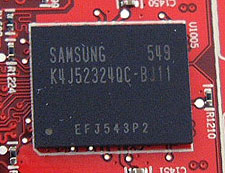 |
| Overclocking Results: |
|
|
Overclocking the Asus EAX1900XTX
2DHTV/512M/A was not very difficult, but it was difficult finding a program
that would allow the right clock speed adjustments that was hard.
RivaTuner didn't work, neither did ATi Tool or PowerStrip. Finally after
playing with Rage3D Tweak did I find our saviour, unfortunately the overclocking
options with Rage3D Tweak were a bit limited.
Starting with
the 'R580' core first, the clock speed was slowly increased in 3-5 MHz intervals. The VPU
core speed was passed the 675 MHz mark but didn't go much higher than that. It topped out
at 682 MHz. Anything higher and the Asus EAX1900XTX videocard would throw a fit
and lock up during 3D benchmarks.
Core temperatures exceeded the 70 degree Celsius mark, perhaps if there were
better cooling on the 'R580' VPU, it might be able to clock higher.

Next up was the 512MB of Samsung GDDR3 memory which has a default DDR
clock speed of 1550 MHz (ie. 775MHz). Going forward in 5 MHz intervals, the Samsung GDDR3 memory
easily hit 800 MHz (or 1600 MHz DDR),
which is smoking fast. Unfortunately that is as high as the Rage3D Tweaker would allow us to go.
In the future when more enthusiast friendly overclocking utilities are
available, we'll revisit overclocking the Asus EAX1900XTX/2DHTV/512M/A videocard
and see if we can't push it a little further into the stratosphere.
The ATI 'R580' core and Samsung GDDR3 memory had absolutely no
issues running together at each components respective maximum speed. Then again, ATi
videocards never really suffer that issue like nVIDIA videocards do. Users who are
willing to be a bit more extreme will definitely benefit from 3rd party VGA cooling systems, like the Zalman VF900 for example, the
Asus EAX1900XTX is certainly one hot videocard when its overclocked!
Prelude to Benchmarks
The details of how the Asus EAX1900XTX 2DHTV/512M/A test system was
configured for benchmarking; the specific hardware, software drivers, operating
system and benchmark versions are indicated below. In the second column are the
general specs for the reference platforms this Radeon X1900 XTX based videocard
is to be compared against. Please take a moment to look over PCSTATS test system
configurations before moving on to the individual benchmark results on the next
page.
 |
| PCSTATS Test System Configurations |
|
|
